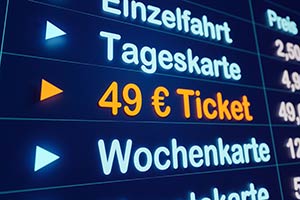Current
informs.
All news at a glance.

We keep you up to date
We bring you the latest developments and news directly to your screen!
Current dates and developments always in view.
Germany ticket as a job ticket
The introduction of the Deutschlandticket on May 1, 2023 will make job tickets even more attractive, which employers can grant tax-free or tax-reduced in many cases.
Employers have long been making it easier for their employees to use public transport, whether through subsidies, the provision of tickets or company contracts that allow them to purchase discounted monthly or annual tickets. However, employer support really took off in 2019 with a new tax exemption regulation for job tickets.
Until 2018, employer benefits for employee travel between home and the first place of work, a wide area of activity or a meeting point were part of taxable wages. Such benefits in kind were only tax-free if the non-cash benefit did not exceed the non-cash benefit exemption limit of EUR 44 per month at the time. However, other benefits in kind must also be taken into account. If the exemption limit is exceeded, all benefits in kind are taxable.
From 2019, the employer's allowances and benefits in kind for the use of public transport on scheduled services on such journeys, in addition to the wages owed anyway, were therefore made tax-free. Cabs and airlines are exempt. The tax concession also applies to private journeys on local public transport. As a result, these non-cash benefits are no longer subject to the monthly non-cash benefit exemption limit, but are offset against the commuting allowance. This is intended to ensure that employees who receive a tax-free job ticket are not unduly advantaged compared to employees who pay for the tickets themselves from their taxed income.

One year later, a flat-rate tax option was introduced for all other subsidies for job tickets, i.e. in particular deferred compensation and other subsidies that the employer does not pay in addition to the salary already owed. The employer can choose between a flat-rate tax rate of 15 % with offsetting against the employee's commuting allowance or a flat-rate tax rate of 25 %. In the second case, all tax obligations are covered, there is no offsetting against the commuting allowance and it is not necessary to show the allowances in the electronic wage tax statement in this case.
Since the beginning of 2020, employers and employees have had several schemes at their disposal that allow employers to grant employees tax-privileged or even tax-free benefits. However, the coronavirus pandemic also hit at the beginning of 2020, resulting in a drastic drop in demand for public transport. In summer 2022, however, public transport really picked up again in one fell swoop thanks to the €9 ticket, which was limited to three months.
The successor to the 9 euro ticket is the 49 euro ticket, which is officially called the "Deutschlandticket" and will be launched on May 1, 2023. Advance sales began shortly before Easter. The introduction of the Deutschlandticket will make the Jobticket even more attractive for employers and employees because not only will the price be significantly lower than the previous monthly prices in many cases, but the ticket will also open up completely new usage options thanks to its nationwide validity.
The demand for Jobtickets will be further fueled by a transitional regulation according to which providers can grant a discount of 5 % on the monthly price until December 31, 2024 if the employer provides the Deutschlandticket as a Jobticket to its employees and grants a subsidy of at least 25 % on the issue price. Because the Deutschlandticket can be canceled monthly by the 10th of each month without any disadvantages, employers and employees who have not yet considered a job ticket can also try out the offer without risk.
However, the optimal tax solution is not the same in all cases because the law now offers several alternatives for tax relief on job tickets, which are associated with different requirements and tax consequences:
-
Normal wage: Theoretically at least, employers and employees can also waive all tax benefits and treat the job ticket as normal taxable pay. Normal wages also exist if the employer waives the flat-rate taxation in the case of deferred compensation and the requirements for a tax-free benefit in kind are not met.
-
Benefit in kind: A job or Germany ticket can still be granted as a tax-free non-cash benefit within the monthly non-cash benefit exemption limit of currently 50 euros. Details on this and why this is usually not the best solution can be found in the section "Germany ticket as a benefit in kind".
-
Job ticket: The employer can pay or subsidize the employee's travel ticket of any value. Under certain conditions, this is then completely tax-free and only involves very manageable disadvantages for the employee (deduction from the commuting allowance). You can find out which conditions must be met in the section "Conditions for the tax-free job ticket".
-
Flat rate I: The job ticket or subsidies for this can be taxed at a flat rate of 15 %, provided that the conditions for tax exemption are not completely fulfilled and the employer benefit only extends to journeys to the place of work, but not to private journeys by public transport. The employer's allowance also reduces the employee's commuting allowance.
-
Flat rate II: Alternatively, the job ticket or employer allowances can be taxed at a flat rate of 25 %. This flat-rate taxation is also possible in the case of salary conversion, but must then be applied uniformly for the entire calendar year instead of tax exemption. In this case, there is no offset against the commuting allowance, so that if the employee's marginal tax rate is higher, the flat-rate taxation of the Deutschlandticket can be worthwhile from a daily commute of 8 km (8 km x 22 working days x EUR 0.30/km = EUR 52.80 commuting allowance per month), even if the conditions for full tax exemption were met.
To ensure that a job ticket remains completely tax-free, i.e. does not count towards the monthly non-cash benefit exemption limit of 50 euros and the employer does not have to pay flat-rate income tax, these conditions must be met:
-
The employer benefit can be a direct provision of the job ticket, a discount on the purchase (Introductory discount for the Deutschlandticket as a job ticket reduces the issue price by 5 % and is not a discount granted by the employer) or a subsidy be.
-
The employer grants the employee the benefit in the context of an employment relationship.
-
The employer's benefit must in addition to the wages owed anyway be granted. Salary conversion or a partial salary waiver are excluded.
-
The applicable Distance allowance is reduced in the amount of the benefit granted by the employer.
-
Private journeys in long-distance passenger transport are excludedi.e. no journeys on ICE, IC, EC or fast long-distance trains from other providers (TGV, Thalys etc.). The Deutschlandticket is only valid for subsidized regional trains anyway.
-
No use of cabsunless they are exceptionally used on scheduled services.
-
No use of air traffic.

In principle, a travel authorization for public transport granted by the employer is still a non-cash benefit that could remain tax-free after the monthly exemption limit of 50 euros. However, there are several reasons that tend to speak against using this regulation for a job ticket.
-
Other services: All benefits in kind within a month are added together to determine the exemption limit for benefits in kind. Even a small other benefit can therefore lead to the exemption limit being exceeded, which would also make the job ticket taxable. In addition, the non-cash benefit exemption limit can be better used for other tax-free employer benefits, i.e. also for a second Germany ticket for the employee's spouse or partner or another relative.
-
Price increase: The Deutschlandticket starts with an introductory price of 49 euros, just below the non-cash benefit exemption limit. However, the price is to be adjusted to inflation in subsequent years. As the non-cash benefit exemption limit was only recently raised, a further increase is not to be expected any time soon, which means that after the first price increase, a tax-free non-cash benefit would only be possible if the employee contributed to the costs in order to reduce the value to be assessed to below 50 euros.
-
Grants: Within the scope of the non-cash benefit exemption limit, subsequent cost reimbursements or earmarked payments by the employer are no longer possible. If the employer does not pay the full Jobticket or Deutschlandticket, but only a subsidy, the employer must pay this directly to the provider or purchase the ticket itself and then give it to the employee at a reduced price. With the job ticket regulation, however, the employer can also pay the employee a subsidy directly (also in the full amount of the ticket price) so that the employee can purchase the ticket themselves.
-
Monthly limit: The exemption limit is reviewed on a monthly basis. A quarterly or annual ticket generally exceeds this limit because the benefit for several months is bundled into one month and the full value of the ticket would therefore be taxable. This problem no longer arises with the Deutschlandticket because it is a monthly subscription anyway.
-
Priority: If the requirements for the tax exemption of a job ticket are met, this regulation takes precedence over the general non-cash benefit exemption limit. The employee cannot avert the reduction of the commuting allowance for a job ticket provided in addition to the salary owed anyway with the argument that a general benefit in kind was granted within the scope of the exemption limit.
If the employer already grants its employees subsidies for a job ticket, it may have to adjust these with the introduction of the Deutschlandticket, because in many cases this is cheaper than the previous monthly ticket. Otherwise, the amount exceeding the cost of the ticket is normal taxable wages.
The Federal Ministry of Finance has already stated that it sees no need for a similar regulation for the Deutschlandticket as was created last year for the 9 euro ticket. With this ticket, employer subsidies are not taxable as long as they do not exceed the employee's expenses for the ticket in the calendar year. It was therefore still possible to correct excessive allowances during the validity of the 9 Euro ticket by offsetting them in a later salary payment period. In the case of the Deutschlandticket, the tax authorities assume that employers had enough time to adjust their payroll accounting in good time because the ticket has been under negotiation for some time.